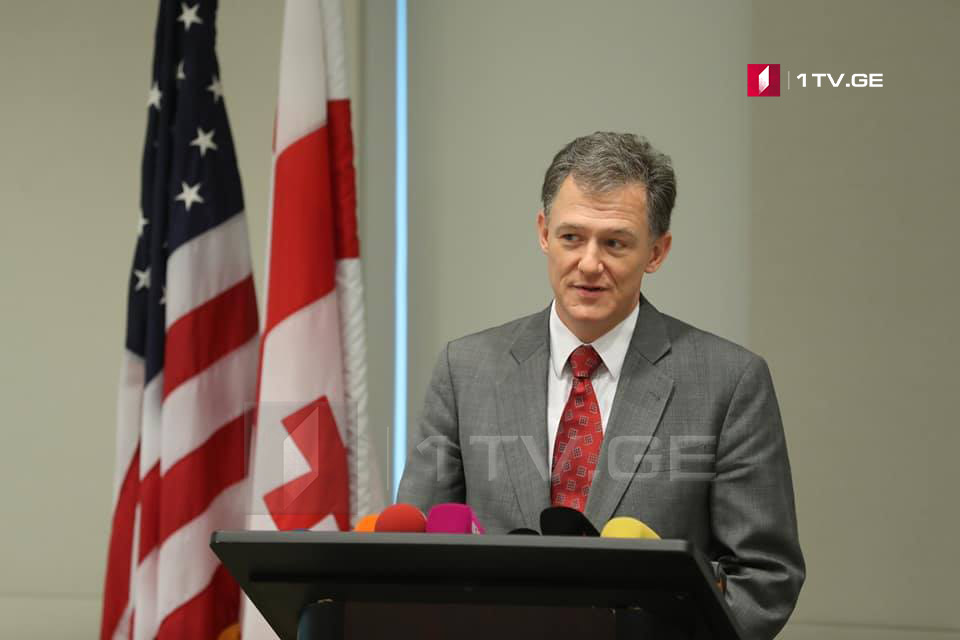
“Georgia tries to show over the years that they’re not just looking for security from NATO, that they are ready to contribute to the collective security element,” George Kent, Deputy Assistant Secretary of State for European and Eurasian Affairs stated at the online discussion by Turkish Heritage Foundation.
“I think that when it comes to the South Caucasus, oftentimes when NATO enters the discussion, it is vis-a-vis the relationship with Georgia, which is, I would say, the most of the countries which have described their aspirations to include joining NATO or Euro Atlantic community, for instance, in the NATO-led mission in Afghanistan.
Georgia currently is the fourth largest troop contributor overall and is the largest non-NATO contributor. I think what Georgia has done over the years is try to show that they’re not just looking for security from NATO, that they are ready to contribute to the collective security element, which is at the core of the NATO concept and have done so with the highest per capita casualties in Afghanistan of any NATO member. They’ve suffered over 30 deaths and several hundred injuries over the years of the mission in Afghanistan.
So I think the Georgians have always been pushing the envelope for what’s possible. Certainly, they would love to have some sort of permanent presence in Georgia and interim. So I think when it comes to the South Caucasus, that’s the primary conversation is about Georgia and its aspirations.
I will say, since it’s oftentimes come up when I’m talking to Georgian officials, that part of the challenge is it’s not enough to join NATO to show that you’re really ready and willing to fight alongside NATO countries, that NATO, in addition to being a military alliance, is a collection of countries with shared values.
And I think is the domestic drama currently in Georgia shows it’s that set of concerns or issues that actually is one of the key hindrances to Georgia’s aspirations, advancing along with the very difficult situation with Russia occupying 20 per cent of its territory in Abkhazia and South Ossetia Tskhinvali region,” George Kent declared.
In the same statement, Kent once again criticized the platform of regional cooperation initiated by Russia and Turkey, saying that Russia uses regional conflicts for its purposes and does not seek to resolve them.
“I think that ultimately going back to the 3+3 conversation and the comment that Turkish colleague has mentioned. It’s not an either-or, it’s not exclusionary, but the very concept of a 3+3 mechanism predicated on Russia being involved in negotiating when it occupies 20 per cent of Georgia against its own commitments to President Sarkozy of France, made in 2008 that they would allow full humanitarian access, which they haven’t, and they would withdraw their troops to their positions pre-2008 conflict, which they haven’t, I think shows the challenge that in trying to come up with architecture to approach the regional challenges, I think that will remain an enduring one.
And so I think, again, that’s the challenge that Georgia faces. There is a mechanism to address that is connected to the OSCE, not NATO. It’s the Geneva International Discussions. And there have been, I think, 54 fruitless rounds of trying to convince the Russians to live up to their obligations. That’s very similar to the conversations that have been happening on Transdnistria and Moldova since the 1990s, where President Yeltsin committed in 1999 at the Istanbul summit to have Russian troops out of Moldova and Transdnistria by the end of 2001.
And we’re now six years past the Russian Putin commitment to getting out of Ukraine by the end of 2015. So I think that does show the challenge collectively that our countries face when we are committed to trying to bring peaceful prosperity to regions. There is a common denominator, unfortunately, and it oftentimes does come back to Russia.
And so I think while it is, we all welcome the end of the fighting that occurred last November when Putin imposed terms. I suspect that’s going to be a bumpy five years. That was the agreement supposed to be renewable. And I anticipate increasing dissatisfaction on the part of Russia, on the approaches that the Russian peacekeepers currently seem to be settling in for a long haul and going back. And as one Georgian deputy foreign minister said last November, this is where we were in 1998. Soon enough, Azerbaijan will be where we were in 2008 and shortly thereafter they’ll be where we are today. And so I think that’s rather pessimistic. But it may be a realistic take on how Russia manipulates conflict to their own benefit without looking to solve the problem in allowing the countries to go forward,” George Kent concluded.
By - Svetlana Alimova





